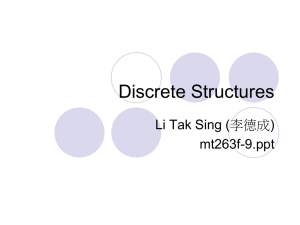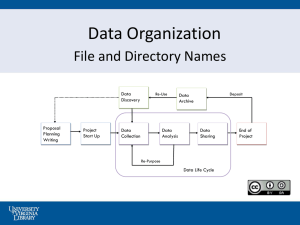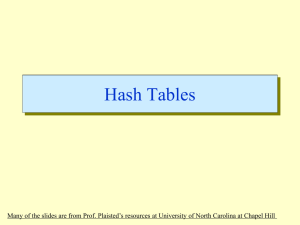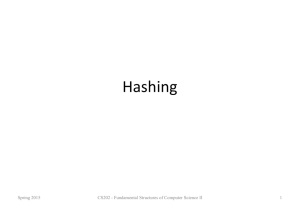6.830 Lecture 6 - MIT Database Group
advertisement
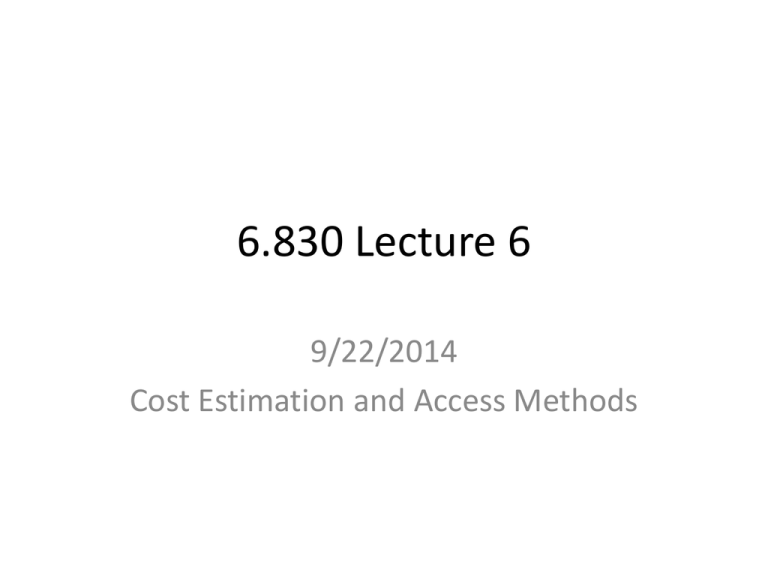
6.830 Lecture 6 9/22/2014 Cost Estimation and Access Methods Database Internals Outline Front End Admission Control Connection Management Query System (sql) Parser (parse tree) Rewriter (parse tree) Planner & Optimizer (query plan) Executor This time Storage System Access Methods Lock Manager Buffer Manager Log Manager Last time Study Break • Assuming disk can do 100 MB/sec I/O • And the following schema: grades (cid int, g_sid int, grade char(2)) students (s_int, name char(100)) 1. Estimate time to sequentially scan grades, assuming it contains 1M records (Consider: field sizes, headers) 1. Estimate time to join these two tables, using nested loops, assuming students fits in memory but grades does not, and students contains 10K records. Hash Index On Disk Hash Table n buckets, on n disk pages Disk page 1 … (‘sam’, 10k, …) (‘joe’, 20k, …) H(f1) e.g., H(x) = x mod n Issues How big to make table? If we get it wrong, either waste space, or end up with long overflow chains, or have to rehash Disk Page n Extensible Hashing • Create a family of hash tables parameterized by k Hk(x) = H(x) mod 2k • Start with k = 1 (2 hash buckets) • Use a directory structure to keep track of which bucket (page) each hash value maps to • When a bucket overflows, increment k (if needed), create a new bucket, rehash keys in overflowing bucket, and update directory Example Directory k=1 Hk(x) Page 0 0 1 1 Hash Table Page Number Hk(x) = x mod k Insert records with keys 0, 0, 2, 3, 2 0 1 Page Contents Example Directory k=1 Hk(x) Page 0 0 1 1 Hash Table Page Number 0 mod 2 = 0 Hk(x) = x mod 2^k Insert records with keys 0, 0, 2, 3, 2 Page Contents 0 0 1 Example Directory k=1 Hk(x) Page 0 0 1 1 Hash Table Page Number 0 mod 2 = 0 Hk(x) = x mod k Insert records with keys 0, 0, 2, 3, 2 Page Contents 0 0 1 0 Example Directory k=1 Hk(x) Page 0 0 1 1 Hash Table Page Number 2 mod 2 = 0 Hk(x) = x mod k Insert records with keys 0, 0, 2, 3, 2 Page Contents 0 0 1 0 2 Example Directory k=1 Hk(x) Page 0 0 1 1 Hash Table Page Number 3 mod 2 = 1 Hk(x) = x mod k Insert records with keys 0, 0, 2, 3, 2 Page Contents 0 0 1 3 0 2 Example Directory k=1 Hk(x) Page 0 0 1 1 Hash Table Page Number 2 mod 2 = 0 Hk(x) = x mod k Insert records with keys 0, 0, 2, 3, 2 Page Contents 0 0 1 3 0 2 - FULL! Example Directory k=1 2 Hk(x) Page 0 0 1 1 2 3 Hash Table Page Number Hk(x) = x mod k Insert records with keys 0, 0, 2, 3, 2 Page Contents 0 0 1 3 0 2 Example Directory k=1 2 Hk(x) Page 0 0 1 1 2 2 3 Hash Table Page Number Allocate new page! Hk(x) = x mod k Insert records with keys 0, 0, 2, 3, 2 Page Contents 0 0 1 3 2 0 2 Example Directory k=1 2 Hk(x) 0 1 2 3 Page 0 1 2 1 Hash Table Page Number Page Contents 0 0 1 3 2 Only allocate 1 new page! Hk(x) = x mod k Insert records with keys 0, 0, 2, 3, 2 0 2 Rehash Example Directory k=1 2 Hk(x) 0 1 2 3 Page 0 1 2 1 Hash Table Page Number 2 mod 4 = 2 Hk(x) = x mod k Insert records with keys 0, 0, 2, 3, 2 Page Contents 0 0 1 3 2 2 0 Example Directory k=1 2 Hk(x) 0 1 2 3 Page 0 1 2 1 Hash Table Page Number 2 mod 4 = 2 Hk(x) = x mod k Insert records with keys 0, 0, 2, 3, 2 Page Contents 0 0 1 3 2 2 0 2 Extra bookkeeping needed to keep track of fact that pages 0/2 have split and page 1 hasn’t
